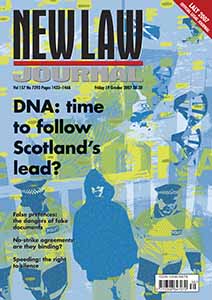
The scars left by the murder of headmaster Philip Lawrence were deepened by the failure to deport his killer. Here, Jason M Hadden and Craig Barlow discuss the issues
Bhandari v UK (App No 42341/04) [2007] All ER (D) 18 (Oct)
It’s not what you know, it’s who you meet, says the Insider
Seventh Earl of Malmesbury v Strutt & Parker [2007] EWHC 2199 (QB), [2007] All ER (D) 103 (Oct)
Defendant costs agents are coming up with ever more inventive challenges to fixed fees, says Amanda Ashton
In brief
Education, not more legislation, will help the public understand
—and respect—the law
MOVERS & SHAKERS

NLJ Career Profile: Mark Hastings, Quillon Law
Mark Hastings, founding partner of Quillon Law, on turning dreams into reality and pushing back on preconceptions about partnership

Kingsley Napley—Silvia Devecchi
New family law partner for Italian and international clients appointed

Mishcon de Reya—Susannah Kintish
Firm elects new chair of tier 1 ranked employment department








